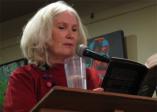Several of us sat in on a web conference call this week to learn more about how the Google Book Settlement affects Canadian authors. The call included a review of the powerpoint presentation found here in pdf, on the Access Copyright site.
There is more information available on Google, including a way to check whether your (in-print) books have been digitized by Google up to January 5, 2009, and are therefore covered by the settlement.
Be warned, you must create a Registry account in order to search for your books, and this registry asks for a lot of personal information; you can’t proceed to the search screen until you provide it. Surely this is some kind of violation of privacy? I have written to Rust Consulting (a Minneapolis-based “trusted leader for complex data management…claims processing and award distribution”), who appears to be the owner of the registry, with the following questions; I’ll let you know if I get an answer:
- Why is this amount of information required for a search to see if I’m included? Why not ask for it only if/when the search has produced results for a claim?
- If I’m not included, what do you intend to do with my personal information?
- Why does your form not explain which fields are required fields? You obviously know which ones are required.
But back to your created works. If your books are covered, you have until January 5, 2010 to claim for payment; or until May 5, 2009 to opt out (if, for example, you want to pursue your own claim through the courts with Google). The money set aside for compensating authors for the violation of copyright entailed by the digitization project amounts to a stonking great payment of around $60 per book for single-authored books. Hurrah! Enough for a bottle of champagne (or slightly more cava or prosecco).
The reason authors are pursuing this is that Google, whose stated mission is “to organize the world’s information and make it universally accessible and useful” (while reaping huge corporate profits themselves), has in this ambition conveniently side-stepped any responsibility to allow authors to earn a living from their writings. Which is the whole point of copyright.
During the web conference, one author wondered why libraries thought they had the right to offer their collections for free digitization, when they do not own the copyright. Nobody had a good answer on this call; it would be interesting to hear a library’s reasoning.
The whole process is skewed towards the interests of everybody except the people who created the work being passed around for free. The libraries who donate their collections to the project get a digitized copy back; the authors of those works do not.









2 Responses to Googley do